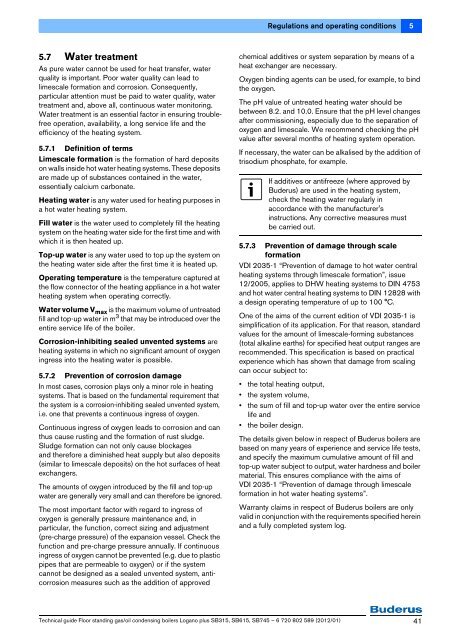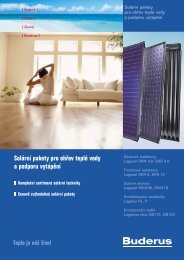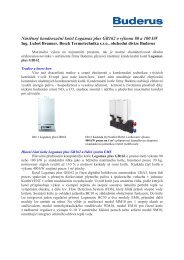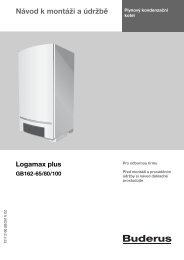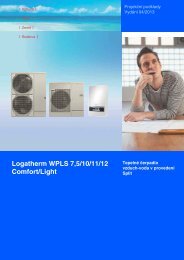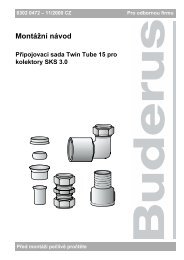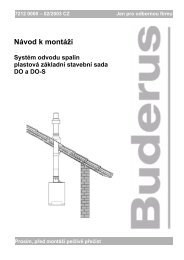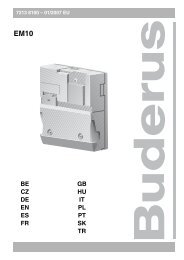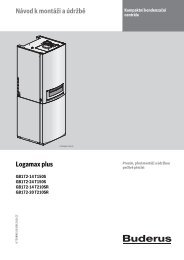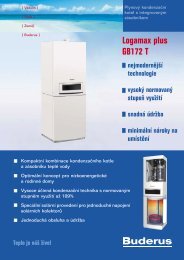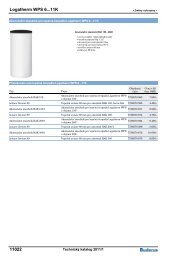Logano plus SB315, SB615, SB745 - Buderus
Logano plus SB315, SB615, SB745 - Buderus
Logano plus SB315, SB615, SB745 - Buderus
- No tags were found...
You also want an ePaper? Increase the reach of your titles
YUMPU automatically turns print PDFs into web optimized ePapers that Google loves.
Regulations and operating conditions55.7 Water treatmentAs pure water cannot be used for heat transfer, waterquality is important. Poor water quality can lead tolimescale formation and corrosion. Consequently,particular attention must be paid to water quality, watertreatment and, above all, continuous water monitoring.Water treatment is an essential factor in ensuring troublefreeoperation, availability, a long service life and theefficiency of the heating system.5.7.1 Definition of termsLimescale formation is the formation of hard depositson walls inside hot water heating systems. These depositsare made up of substances contained in the water,essentially calcium carbonate.Heating water is any water used for heating purposes ina hot water heating system.Fill water is the water used to completely fill the heatingsystem on the heating water side for the first time and withwhich it is then heated up.Top-up water is any water used to top up the system onthe heating water side after the first time it is heated up.Operating temperature is the temperature captured atthe flow connector of the heating appliance in a hot waterheating system when operating correctly.Water volume V max is the maximum volume of untreatedfill and top-up water in m 3 that may be introduced over theentire service life of the boiler.Corrosion-inhibiting sealed unvented systems areheating systems in which no significant amount of oxygeningress into the heating water is possible.5.7.2 Prevention of corrosion damageIn most cases, corrosion plays only a minor role in heatingsystems. That is based on the fundamental requirement thatthe system is a corrosion-inhibiting sealed unvented system,i.e. one that prevents a continuous ingress of oxygen.Continuous ingress of oxygen leads to corrosion and canthus cause rusting and the formation of rust sludge.Sludge formation can not only cause blockagesand therefore a diminished heat supply but also deposits(similar to limescale deposits) on the hot surfaces of heatexchangers.The amounts of oxygen introduced by the fill and top-upwater are generally very small and can therefore be ignored.The most important factor with regard to ingress ofoxygen is generally pressure maintenance and, inparticular, the function, correct sizing and adjustment(pre-charge pressure) of the expansion vessel. Check thefunction and pre-charge pressure annually. If continuousingress of oxygen cannot be prevented (e.g. due to plasticpipes that are permeable to oxygen) or if the systemcannot be designed as a sealed unvented system, anticorrosionmeasures such as the addition of approvedchemical additives or system separation by means of aheat exchanger are necessary.Oxygen binding agents can be used, for example, to bindthe oxygen.The pH value of untreated heating water should bebetween 8.2. and 10.0. Ensure that the pH level changesafter commissioning, especially due to the separation ofoxygen and limescale. We recommend checking the pHvalue after several months of heating system operation.If necessary, the water can be alkalised by the addition oftrisodium phosphate, for example.If additives or antifreeze (where approved by<strong>Buderus</strong>) are used in the heating system,check the heating water regularly inaccordance with the manufacturer'sinstructions. Any corrective measures mustbe carried out.5.7.3 Prevention of damage through scaleformationVDI 2035-1 “Prevention of damage to hot water centralheating systems through limescale formation”, issue12/2005, applies to DHW heating systems to DIN 4753and hot water central heating systems to DIN 12828 witha design operating temperature of up to 100 °C.One of the aims of the current edition of VDI 2035-1 issimplification of its application. For that reason, standardvalues for the amount of limescale-forming substances(total alkaline earths) for specified heat output ranges arerecommended. This specification is based on practicalexperience which has shown that damage from scalingcan occur subject to:• the total heating output,• the system volume,• the sum of fill and top-up water over the entire servicelife and• the boiler design.The details given below in respect of <strong>Buderus</strong> boilers arebased on many years of experience and service life tests,and specify the maximum cumulative amount of fill andtop-up water subject to output, water hardness and boilermaterial. This ensures compliance with the aims ofVDI 2035-1 “Prevention of damage through limescaleformation in hot water heating systems”.Warranty claims in respect of <strong>Buderus</strong> boilers are onlyvalid in conjunction with the requirements specified hereinand a fully completed system log.Technical guide Floor standing gas/oil condensing boilers <strong>Logano</strong> <strong>plus</strong> <strong>SB315</strong>, <strong>SB615</strong>, <strong>SB745</strong> – 6 720 802 589 (2012/01) 41


